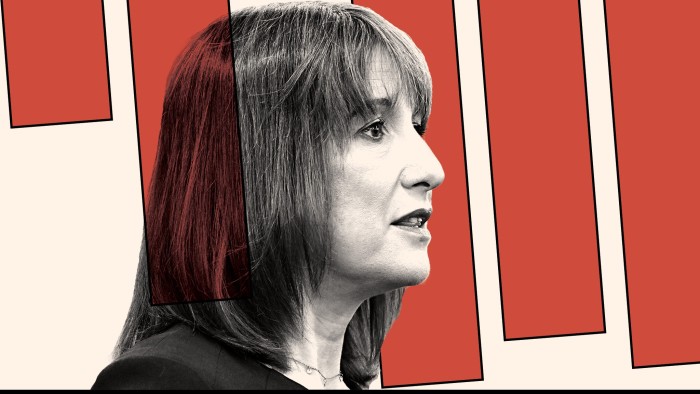Rachel Reeves said this week she had “listened” to voters. If that is the case, she will know all too well that they are not impressed: not just over her calamitous winter fuel payment policy, but over her performance since taking office.
As she prepares to set out her spending review on Wednesday, Labour’s first chancellor for almost 15 years knows this is a defining moment both for Sir Keir Starmer’s government and for her own position.
Few occupants of 11 Downing Street have seen their approval ratings plummet so quickly. Polls suggest she is wallowing in an abyss of unpopularity previously occupied by ex-Conservative chancellor Kwasi Kwarteng at the time of his doomed 2022 “mini-Budget”.
The juxtaposition of Reeves removing fuel subsidies from 10mn pensioners last July with revelations about her receiving freebie clothes created a toxic aura around her. “That’s when people formed a moral judgment on us,” said one newly elected Labour MP.
Her autumn Budget, with its £25bn business tax rise, created a new wellspring of animosity: corporate Britain — which had largely been won over during a two-year charm offensive in opposition — felt betrayed by the chancellor. Meanwhile, Labour MPs have recoiled from her £5bn plan to cut welfare payments to the sick and disabled.
“She is brave enough and honest enough to take tough decisions,” said one close colleague. “She knew it was going to make her unpopular.”
The big question this week is whether Reeves can start to turn things around.
The spending review is the moment when Reeves — and the government — show what they really care about. Money will be allocated to departments and capital projects for the rest of the parliament. Choices will reveal priorities.
For Reeves, this is a chance to show she is not a desiccated counting machine, obsessed by fiscal rules, but that she has a vision for the country and for shaking it out of a growth torpor that has lasted almost 20 years.
Completing this week’s U-turn on the winter fuel policy — restoring the benefit to most pensioners — is the first stage of what Reeves hopes will be a reset moment for her chancellorship.
Her core message on Wednesday will be that the “choices” she has made — including keeping a grip on day-to-day spending — have created fiscal space and market confidence to unleash an extra £113bn for capital spending over the parliament.
“The idea that she is George Osborne in disguise is ridiculous,” said one ally of the chancellor, referring to the former Conservative chancellor who presided over austerity policies in the early 2010s. “This is absolutely not an austerity spending review.”
Overall day-to-day spending will rise by 1.2 per cent in real terms every year for the rest of the parliament. Health and defence spending will swallow up the lion’s share of the extra cash, leaving real cuts in some “unprotected” departments.
Reeves will argue that this is prudent — but not severe — financial management. She will say that current spending will be £190bn higher over the parliament than under Tory plans: her first Budget saw taxes rise by £40bn a year and borrowing up by £28bn a year.
But Reeves’ focus will be on the extra spending on capital — intended to boost Britain’s growth potential — as the chancellor shifts from Scrooge to Lady Bountiful. Nuclear power stations, rail schemes, roads and housing will all be showered with borrowed cash.
The chancellor’s team believes Reeves is already turning the corner in terms of her perception in the Labour party, after she started her long retreat on the winter fuel payment and hinted that a further softening of welfare policies was on the way.
She remains the most unpopular member of the cabinet among Labour party members, though her approval rating over the past two months has improved by 13 percentage points to only minus 27.8, according to the LabourList website.
But some believe she is still in trouble, and that her retreat on winter fuel payments leaves her vulnerable to pressure on other contentious issues, including a £5bn plan to cut the country’s bloated welfare bill.
“The U-turn on winter fuel helps in the short term, but undermines her in the medium term, when it comes to her authority and her ability to get the welfare reform package through unamended,” said one Labour grandee.
Reeves’ team is at pains to draw a distinction between the U-turn on winter fuel — where the chancellor says she “listened to people’s concerns” — and her willingness to bow to concerns raised by Labour MPs.
For example, the chancellor is under fierce pressure from Labour MPs to end the two-child benefit cap, but one colleague noted that the limit was popular with many voters. “We have to prioritise,” they said. “Voters aren’t in the same place as the party.”
They argue that the public are far more sympathetic than Labour MPs to Reeves’ determination to cut welfare spending, although members of the public obviously do not have a vote in the House of Commons. Big parliamentary battles lie ahead.
John McDonnell, former shadow chancellor and now an independent MP, said Reeves had another problem: big announcements on Wednesday about capital spending may not yield the political dividend she expects.
“Capital spend takes years to produce political results, while cuts in revenue spending on services like council services are felt adversely quickly,” he said. Reeves tells colleagues that the public have already embraced pre-announced plans to boost local transport schemes.
Meanwhile, Reeves has been hit by external events — particularly US President Donald Trump’s trade wars and rising global borrowing costs — leaving her badly exposed ahead of this year’s autumn Budget. Her £9.9bn of “headroom” against her own borrowing rules is wafer thin.
While first-quarter GDP was stronger than expected, that has been tempered by forecast downgrades from organisations including the IMF and the OECD.
Cathal Kennedy, senior UK economist at RBC Capital Markets, warned that as soon as the spending review is out of the way the Budget “speculation machine” will crank up as investors discuss the prospects of a fresh round of tax increases.
Making matters more difficult is Reeves’ decision to rule out raising the big-ticket personal taxes of VAT, income tax and employees’ national insurance, forcing the Treasury to examine more narrowly targeted measures. “None of this is conducive to long-term decision-making,” he said.
Ruth Gregory at Capital Economics agreed: “Given she has left herself such slim headroom, it does mean she is at the mercy of financial and economic events.”
Nigel Farage, Reform UK leader, recently claimed that he had never seen “anyone so hopelessly out of their depth” as Reeves, though the chancellor currently enjoys the solid backing of a more relevant party leader in Starmer.
“Keir is 100 per cent behind Rachel,” said one ally of the prime minister. A senior Labour MP and former minister said: “Her position is absolutely fine. For now. Her challenge is the voters. Labour voters now flirting with Reform can’t stand her.”
Reeves says she has “listened” to what people have been saying and on Wednesday she will respond. Her decisions in the spending review will provide a platform for Labour’s next election campaign. The solidity of that platform is about to be tested.
“We know voters are desperate for change, but we do think the plan is working,” said one colleague of the chancellor. “Rachel loves nothing more than proving people who underestimate her wrong.”
Data visualisation by Amy Borrett and Jonathan Vincent










